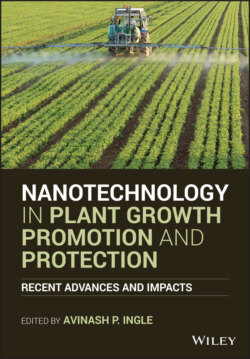Читать книгу Nanotechnology in Plant Growth Promotion and Protection - Группа авторов - Страница 60
3.5 Conclusions
ОглавлениеThis chapter summarizes the plant application methods of Zn NPs and their positive effects on plant growth. The seed application of Zn NPs can improve seed germination percent, radicle growth, and plumule growth. If applied to a standing crop, the Zn NPs can enhance leaf area, root growth, shoot growth, pigment content in leaf, yield, and quality of production. At the molecular level, Zn NPs affect plant metabolic processes like the production of plant hormones, and the activation of antioxidants and reductases. Zn NPs can also enhance plants' tolerance level to abiotic stresses, such as soil salinity, drought, or heavy metals in the environment.
The studies reviewed in this chapter demonstrate the beneficial effects of Zn NPs for plant growth, however, there is a remarkable lack of information on some key aspects, which prevents a better application of Zn PNs for sustainable agriculture. Moreover, for sustainable use of nanotechnology in agriculture, certain needs to be extensively studied which mainly include understanding the impact of different properties of NPs (shape, size, surface coatings, etc.) on plant growth for better design of Zn NPs. Zn NPs are widely known for their antimicrobial effects, their application against seed and plant pathogen is lacking. The benefits of seed treatments to produce disease‐free seedling and antimicrobial mechanisms to protect against specific diseases are still to be studied further. Similarly, Zn NPs are found effective in enhancing crop performance under abiotic stress, which can be particularly useful for promoting plant growth in a stressed environment. However, studies on stress tolerance and the related mechanism are still lacking. Moreover, the impacts of Zn NPs highly vary with crop species, but there are not sufficient researches done within comparative studies on plants to identify the genetic traits which control the interactions between Zn NPs and plants. To provide immediate supplement foliar application can be very effective. While considering fertilizer use efficiency, sustainability, and crop health substrate application could be a better option, where cytotoxicity due to direct absorption can be eliminated at higher concentrations. So, more studies should be done simultaneously to fully understand the positive and negative effects of the Zn application method. It is proved that proper application of Zn NPs significantly increases leaf pigment content and plant growth in most crops. Still, the contribution toward the quality and quantity of economic production of most of the crops has not been explored well which needs to address in a scientific manner. Finally, it is well‐known that most of the studies done so far are limited to the laboratory as a well‐controlled system. Therefore, more and more field studies are needed for better understanding of crops response to Zn NPs in the highly complex systems with a multitude of variables.
